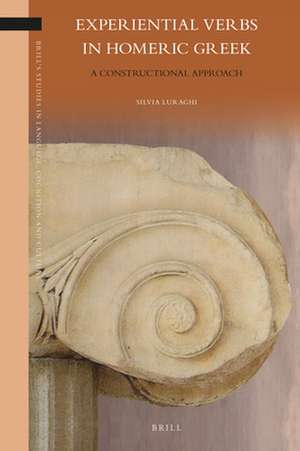Experiential Verbs in Homeric Greek: A Constructional Approach: Brill's Studies in Language, Cognition and Culture, cartea 27
Autor Silvia Luraghien Limba Engleză Hardback – 4 noi 2020
Din seria Brill's Studies in Language, Cognition and Culture
- 15%
 Preț: 636.92 lei
Preț: 636.92 lei - 18%
 Preț: 634.82 lei
Preț: 634.82 lei - 18%
 Preț: 727.99 lei
Preț: 727.99 lei - 18%
 Preț: 681.15 lei
Preț: 681.15 lei - 18%
 Preț: 679.99 lei
Preț: 679.99 lei - 18%
 Preț: 522.06 lei
Preț: 522.06 lei - 18%
 Preț: 636.47 lei
Preț: 636.47 lei - 18%
 Preț: 703.78 lei
Preț: 703.78 lei - 15%
 Preț: 503.69 lei
Preț: 503.69 lei - 18%
 Preț: 546.00 lei
Preț: 546.00 lei - 18%
 Preț: 889.17 lei
Preț: 889.17 lei - 18%
 Preț: 524.79 lei
Preț: 524.79 lei - 18%
 Preț: 659.85 lei
Preț: 659.85 lei - 18%
 Preț: 763.68 lei
Preț: 763.68 lei - 18%
 Preț: 903.60 lei
Preț: 903.60 lei - 18%
 Preț: 791.45 lei
Preț: 791.45 lei - 18%
 Preț: 606.87 lei
Preț: 606.87 lei - 18%
 Preț: 595.58 lei
Preț: 595.58 lei - 18%
 Preț: 590.89 lei
Preț: 590.89 lei - 18%
 Preț: 632.38 lei
Preț: 632.38 lei - 18%
 Preț: 605.47 lei
Preț: 605.47 lei - 18%
 Preț: 580.76 lei
Preț: 580.76 lei - 18%
 Preț: 753.78 lei
Preț: 753.78 lei - 18%
 Preț: 888.81 lei
Preț: 888.81 lei - 18%
 Preț: 635.13 lei
Preț: 635.13 lei - 18%
 Preț: 635.13 lei
Preț: 635.13 lei - 18%
 Preț: 803.22 lei
Preț: 803.22 lei - 18%
 Preț: 635.24 lei
Preț: 635.24 lei - 18%
 Preț: 582.69 lei
Preț: 582.69 lei - 18%
 Preț: 556.04 lei
Preț: 556.04 lei - 18%
 Preț: 690.15 lei
Preț: 690.15 lei - 18%
 Preț: 682.28 lei
Preț: 682.28 lei - 18%
 Preț: 777.74 lei
Preț: 777.74 lei - 18%
 Preț: 575.74 lei
Preț: 575.74 lei
Preț: 771.68 lei
Preț vechi: 941.07 lei
-18% Nou
Puncte Express: 1158
Preț estimativ în valută:
147.66€ • 154.58$ • 122.18£
147.66€ • 154.58$ • 122.18£
Carte indisponibilă temporar
Doresc să fiu notificat când acest titlu va fi disponibil:
Se trimite...
Preluare comenzi: 021 569.72.76
Specificații
ISBN-13: 9789004442481
ISBN-10: 9004442480
Pagini: 312
Dimensiuni: 155 x 235 mm
Greutate: 0 kg
Editura: Brill
Colecția Brill
Seria Brill's Studies in Language, Cognition and Culture
ISBN-10: 9004442480
Pagini: 312
Dimensiuni: 155 x 235 mm
Greutate: 0 kg
Editura: Brill
Colecția Brill
Seria Brill's Studies in Language, Cognition and Culture
Cuprins
Preface
Abbreviations
List of Figures and Tables
1 Introduction
1.1The Construal of Situations
1.2A Construction-Based View of Homeric Greek
1.3Embodiment and Domains of Experience
1.4Homeric Greek
1.5Outline of the Book
2 Experiential Situations
2.1Experiential Situation Types
2.2Semantic Roles of Participants in Experiential Situations
2.3The Encoding of Experiential Situations Cross-linguistically
2.4Discussion
3 Argument Structure Constructions in Homeric Greek
3.1Properties of Constructions
3.2Constructions and Construction Variation with Two-Place Verbs
3.3Complementation in Homeric Greek
3.4Discussion
4 The Ancient Greek Verb
4.1Aspect and Tense
4.2Voice
4.3Discussion
5 At the Edges of the Experiential Domain: Bodily Sensations and Volition
5.1Bodily Sensations
5.2Volitionality and Need
5.3Discussion
6 Perception
6.1Visual Perception
6.2Aural Perception
6.3Other Types of Sensory Perception
6.4From Perception to Evidentiality
6.5Discussion
7 Cognition
7.1Think
7.2Know / Learn
7.3Remember / Forget
7.4Discussion
8 Emotions
8.1Verbs of Emotion with the NomDat Construction
8.2Verbs of Emotion with the NomGen Construction
8.3Verbs of Emotion with the NomAcc Construction
8.4Alternating Constructions
8.5Dative Experiencer Constructions
8.6Discussion
9 Causative Verbs
9.1The (Anti)causative Alternation
9.2Animate Verbs
9.3Inanimate Verbs
9.4Discussion
10 Concluding Remarks
10.1The Meaning of Construction Variation with Experiential Verbs
10.2Embodiment and Social Setting
10.3The Encoding of Experiential Situations in Homeric Greek
10.4Constructions’ Productivity
10.5Verbal Voice
10.6Outlook
References
Index
Abbreviations
List of Figures and Tables
1 Introduction
1.1The Construal of Situations
1.2A Construction-Based View of Homeric Greek
1.3Embodiment and Domains of Experience
1.4Homeric Greek
1.5Outline of the Book
2 Experiential Situations
2.1Experiential Situation Types
2.2Semantic Roles of Participants in Experiential Situations
2.3The Encoding of Experiential Situations Cross-linguistically
2.4Discussion
3 Argument Structure Constructions in Homeric Greek
3.1Properties of Constructions
3.2Constructions and Construction Variation with Two-Place Verbs
3.3Complementation in Homeric Greek
3.4Discussion
4 The Ancient Greek Verb
4.1Aspect and Tense
4.2Voice
4.3Discussion
5 At the Edges of the Experiential Domain: Bodily Sensations and Volition
5.1Bodily Sensations
5.2Volitionality and Need
5.3Discussion
6 Perception
6.1Visual Perception
6.2Aural Perception
6.3Other Types of Sensory Perception
6.4From Perception to Evidentiality
6.5Discussion
7 Cognition
7.1Think
7.2Know / Learn
7.3Remember / Forget
7.4Discussion
8 Emotions
8.1Verbs of Emotion with the NomDat Construction
8.2Verbs of Emotion with the NomGen Construction
8.3Verbs of Emotion with the NomAcc Construction
8.4Alternating Constructions
8.5Dative Experiencer Constructions
8.6Discussion
9 Causative Verbs
9.1The (Anti)causative Alternation
9.2Animate Verbs
9.3Inanimate Verbs
9.4Discussion
10 Concluding Remarks
10.1The Meaning of Construction Variation with Experiential Verbs
10.2Embodiment and Social Setting
10.3The Encoding of Experiential Situations in Homeric Greek
10.4Constructions’ Productivity
10.5Verbal Voice
10.6Outlook
References
Index
Notă biografică
Silvia Luraghi, Ph.D. (1987), University of Pavia, is Professor of Linguistics at that university. She has published extensively on Ancient Greek and Indo-European linguistics, and is associate editor of the Encyclopedia of Ancient Greek Language and Linguistics (Brill, 2014).
